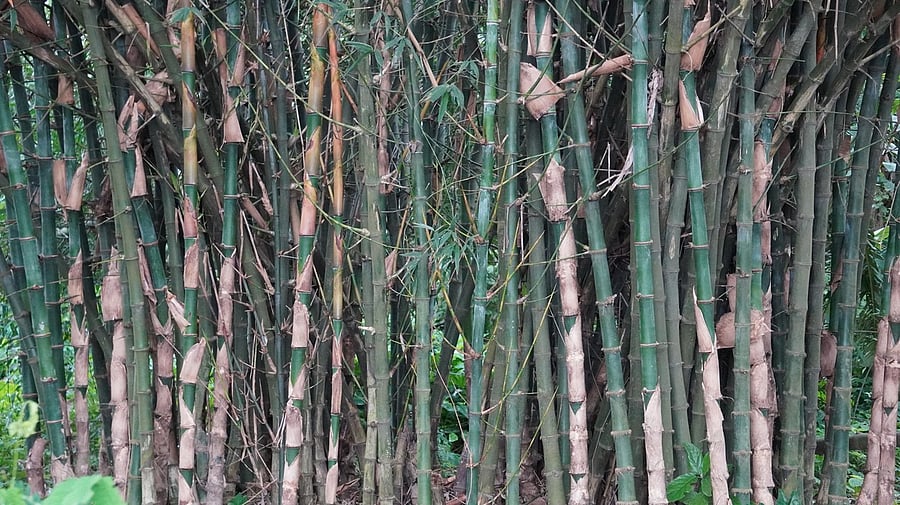
Maharashtra’s ‘Bamboo Industrial Policy’ approved by state cabinet
Credit: iStock photo
Mumbai: In a landmark step towards a sustainable and green Maharashtra, the state government has approved the ambitious Maharashtra Bamboo Industrial Policy-2025, aimed at attracting investments worth Rs 50,000 crore.
In a state Cabinet meeting chaired by Chief Minister Devendra Fadnavis, the policy was finalized to promote bamboo as a cornerstone for sustainable industrial growth, rural employment generation, and environmental balance.
Veteran politician and former MLC Pasha Patel, Chairman of the State Agricultural Price Commission and Executive Chairman of the Chief Minister’s Environmentally Balanced Development Task Force, has been advocating for bamboo cultivation as a solution to climate change challenges for many years.
On September 18 last month, an International Bamboo Conference was held under Patel’s initiative, where he reiterated the urgent need to implement a bamboo industrial policy in the state.
During the conference, Fadnavis assured that the policy would be implemented soon.
Through the efforts of State Industries Minister Uday Samant, Maharashtra has introduced this new bamboo policy to its industrial landscape.
Patel noted that no other state or country has implemented such a policy, making this a significant step towards sustainable development.
This policy will provide a new direction to the state’s industrial framework, emphasizing innovation, skill development, value addition, large-scale bamboo cultivation, and the creation of necessary infrastructure.
The policy promotes Bamboo Farmer Producer Organizations (FPOs), contract farming, and the use of bamboo in energy, industry, and household sectors. Infrastructure such as anchor units and Common Facility Centers (CFCs) will be established, along with 15 bamboo clusters across the state. Micro Common Facility Centers (MCFCs) will be set up for bamboo artisans in remote areas. Agricultural universities will collaborate on bamboo research and development, with training programs organized for farmers and international partnerships established where necessary.
Under the cluster-based bamboo industrial development policy, 15 bamboo industrial clusters will be developed, each with a lead anchor unit and Common Facility Center (CFC), focusing on bamboo processing, value addition, research, and innovation, as stated by Industries Minister Uday Samant.
The state government’s bamboo policy aims to position Maharashtra as a leader in bamboo-based industries, focusing on sustainable economic development, rural empowerment, skill development, and technological innovation. The policy is expected to promote environmental conservation and the growth of green industries.
Maharashtra Bamboo Policy 2025–30
++ A budget of Rs 1,534 crore has been approved for the implementation of the policy from 2025–30, with Rs 11,797 crore allocated for a 20-year period. Additionally, Rs 50 crore has been approved for the current financial year.
++ Incentives for Bamboo Processing Industries
Bamboo-related processing industries will receive subsidies on interest, electricity, stamp duty, and power tariffs. A Rs 300 crore venture capital fund has also been approved for innovation-based startups and micro, small, and medium enterprises (MSMEs) in the bamboo sector.
++ Bamboo Development Project: Rs 4,271 Crore
++ In collaboration with the Asian Development Bank, a bamboo development project worth approximately Rs 4,271 crore has been proposed to the central government. This project will support Farmer Producer Organizations (FPOs) with quality sapling production, subsidies, and training. It will also ensure coordination between bamboo producers, industries, and distributors. A Production-Linked Incentive (PLI) scheme will reduce the demand-supply gap and foster market development.
++ Bamboo biomass will be used to replace 5–7% of fuel in thermal power plants. Technologies such as GIS, MIS, blockchain, drones, and tissue culture labs will drive the development of the bamboo value chain. Bamboo cultivation will be promoted on fallow and public lands through MGNREGA.
++ Budget for Bamboo Cultivation
A budget of Rs 1,534 crore has been approved for 2025–30, Rs 11,797 crore for 20 years, and R 50 crore for the current financial year.
Global Bamboo Market
By 2030, the global bamboo market is projected to reach USD 88.43 billion. India’s current bamboo export share is 2.3%, with a domestic industry worth Rs 28,000 crore and a 4% forest area. The country’s annual bamboo production capacity is 32.03 lakh tonnes. Maharashtra, with 1.35 million hectares (third in India), produced 9.47 lakh tonnes of bamboo in 2022. With available fallow land, the state’s production capacity could reach approximately 157.12 lakh tonnes annually. Currently, bamboo clusters exist in Amravati, Sindhudurg, and Bhandara districts.